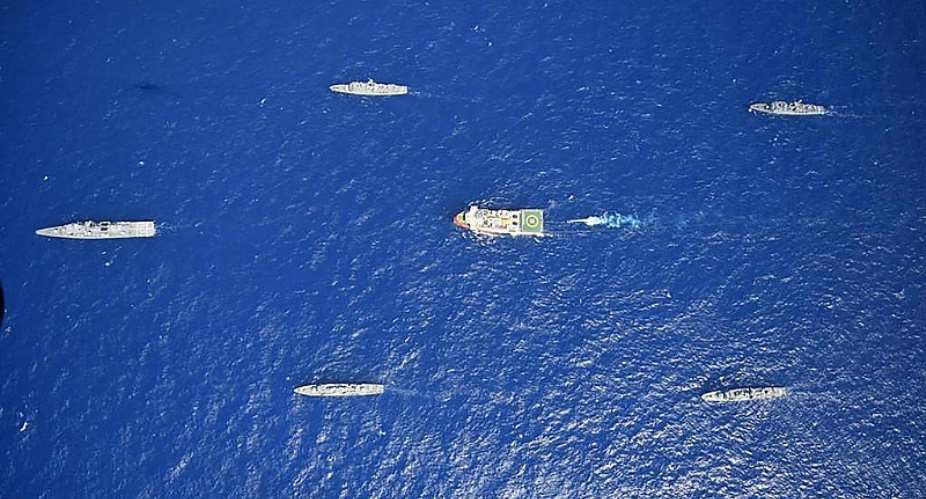France's decision to send warships to help Greece in its Mediterranean standoff with Ankara was adding "fuel to the fire", according to Turkish rear admiral Cem Gurdeniz, who warned President Emmanuel Macron not to engage in threats which could jeopardize the Nato partnership.
As warships from France, Greece and Turkey converge on a disputed patch of the eastern Mediterranean Sea, Rear Admiral Cem Gurdeniz launched into an open criticism of French President Emmanuel Macron's handling of the affair.
"I'm fed up with Macron's everyday verbal threats," the 62-year-old Francophone and Francophile Gurdeniz told AFP.
"For many Turks now, France is acting like an 'enfant terrible'. Can you imagine, they are threatening Turkey?" he asked.
The discovery of major natural gas deposits in waters surrounding Cyprus and the Greek island of Crete has triggered a scramble for energy riches and revived old regional rivalries.
Secure maritime navigation
On 1 August, a Defence Cooperation Agreement between France and Cyprus, signed three years earlier, came into force.
On 13 August, the French Ministry of Defence said in a statement that France would "temporarily strengthen" its military presence in the Mediterranean, participate in naval exercises with the Greek navy and aim to help "secure maritime navigation" in the region.
"If France continues such provocative actions... that would not serve regional peace and stability -- that would add fuel to the fire and France should avoid that," Gurdeniz retorted.
End of Nato?
The biggest tensions are between historically uneasy NATO allies Turkey and Greece, which almost went to war over some uninhabited islets in the Aegean Sea in 1996.
Gurdeniz, now retired, helped craft the Mavi Vatan, or "Blue Homeland" vision over a decade ago which is now becoming a reality for Turkish President Recep Tayyip Erdogan as he stakes his claim in the region.
EU foreign ministers convened an emergency video conference last week after Greek and Turkish warships collided in hotly disputed circumstances.
"If Greece pulls the trigger, it will be the end of NATO," Gurdeniz said, implying that Turkey would then withdraw from the Cold War-era military alliance.
"European countries should put pressure on Greece so that it abandons" some of its maritime claims, he said.
'Cold blood'
Erdogan has tempered his heated rhetoric with calls for talks, which have been spearheaded with sporadic success by German Chancellor Angela Merkel.
Germany's mediation effort between Turkey and Greece aims to defuse the tension over the disputed continental shelf areas in the eastern Mediterranean ahead of the European Union's informal foreign ministers' meeting on 27 August, according to the English version of the Turkish newspaper Hurriyet Daily News.
German Foreign Minister Heiko Maas will be visiting Athens and Ankara on 25 August to meet first with his Greek counterpart, Nikos Dendias, and then Turkish counterpart, Mevlüt Çavuşoğlu, according to the paper.
Gurdeniz welcomed the move towards diplomacy and said that "we should think with cold blood, soberly, prudently."
But he saw no need for outside mediation, suggesting that hostilities will only end when Greeks and Turks sit down and frankly talk their problems out.
Tough line
Gurdeniz overwhelmingly approves of Edrogan's tough line, but also regrets Turkey's growing diplomatic isolation in the increasingly volatile region.
He called Turkey's decision to rupture its relations with Egypt following the army's ouster of Islamist president Mohamed Morsi in 2013 "a mistake".
"Turkey could have won over Egypt. Also, starting with Egypt, we could have made some gains with Israel too," Gurdeniz said.
But his eyes lit up and his easy smile broadened when talking about the "growing interest of young people" in Turkey's maritime claims.
"I do a lot of interviews with YouTubers," said the retired admiral, pointing out that the annual enrolment of new cadets in navy schools is steadily rising.
He also pointed out that the Mediterranean accounted for just "one percent" of the world's oceans and seas.
"I always stress that Turkey should go beyond this one percent: the Red Sea, the Arabian Sea and the Atlantic," Gurdeniz said.
"Turkey should have a presence down there. This is the reflection of a growing power."





 SSNIT must be managed without gov’t interference – Austin Gamey
SSNIT must be managed without gov’t interference – Austin Gamey
 Ejisu by-election could go either way between NPP and independent candidate — Gl...
Ejisu by-election could go either way between NPP and independent candidate — Gl...
 We never asked ministers, DCEs to bring NPP apparatchiks for returning officer r...
We never asked ministers, DCEs to bring NPP apparatchiks for returning officer r...
 No one denigrated the commission when you appointed NDC sympathizers during your...
No one denigrated the commission when you appointed NDC sympathizers during your...
 Used cloth dealers protests over delayed Kumasi Central Market project
Used cloth dealers protests over delayed Kumasi Central Market project
 A/R: Kwadaso onion market traders refuse to relocate to new site
A/R: Kwadaso onion market traders refuse to relocate to new site
 Dumsor: Corn mill operators at Kaneshie market face financial crisis
Dumsor: Corn mill operators at Kaneshie market face financial crisis
 Jamestown fishermen seek support over destruction of canoes by Tuesday's heavy d...
Jamestown fishermen seek support over destruction of canoes by Tuesday's heavy d...
 Election 2024: EC to commence voter registration exercise on May 7
Election 2024: EC to commence voter registration exercise on May 7
 Western Region: GWL hopeful of restoration of water today in Sekondi-Takoradi
Western Region: GWL hopeful of restoration of water today in Sekondi-Takoradi
